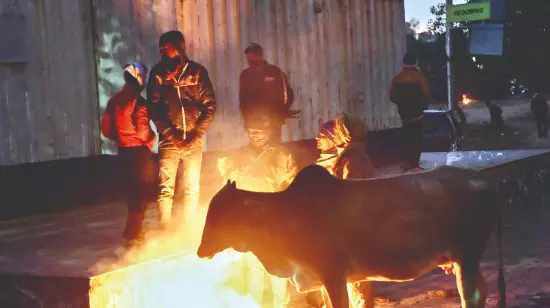Homeless face early chill and dengue spike as govt rushes to ready shelters

New Delhi: With weather agencies warning of an early and harsh winter due to the La Niña effect, Delhi’s homeless population finds itself caught between biting cold and a rising wave of dengue and malaria cases. On the city’s pavements and under flyovers, thousands are bracing for sleepless nights.
At a dimly lit corner near Govindpuri, 48-year-old Surya Kumar wraps himself in a tattered shawl. “It’s only October, but the cold has started,” he said. “We’re used to sleeping out here, but this time, the chill and mosquitoes have made it worse. There are not
enough shelters, even when people will start shifting to shelter homes most will be full before we even reach.”
In Jamia Nagar, 35-year-old Rukhsana, who lives with her three children on a narrow pavement, said the last few days have been “a nightmare.” “Sometimes the rain soaks our bedding, and we have to sit all night waiting for it to dry,” she said. “Two of my children have dengue, they keep shivering, and there’s no proper place to rest so I had to send them to my relatives place. It gets very difficult to manage.”
Nearby, 62-year-old Abdul Qadir, who has lived on the streets for over a decade, said he fears the worst is yet to come. “Every year, people die of cold. This time it feels like winter has arrived early. We just need a dry place, a blanket, and some safety,” he said quietly.
The city’s doctors and social workers say the crisis is deepening fast. “We are seeing a sharp increase in vector-borne diseases among the homeless,” said Dr. Abid Khan, a volunteer physician working in Jamia Nagar. “The lack of sanitation and protection makes them extremely vulnerable. Without access to mosquito nets or sanitation, these families face double danger of disease, and cold. Early intervention is crucial.”
Additionally, the Delhi Urban Shelter Improvement Board (DUSIB) has floated tenders worth Rs.3.41 crore for 250 waterproof, fire-retardant pagoda tents to serve as temporary night shelters. Each tent will have beds, mattresses, LED lighting, fire-safety systems, and basic medical kits.
A DUSIB official said the shelters are expected to be ready before the cold peaks. “We are expediting the process to ensure no one sleeps in the open this winter,” the official stated.
But on the streets, urgency feels distant. 27-year-old migrant worker Lalu Kumar summed up the mood. “Every year, we hear about plans,” he said, tightening his blanket.
“But by the time the tents
come up, half of us have already fallen sick.”



